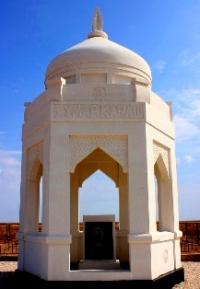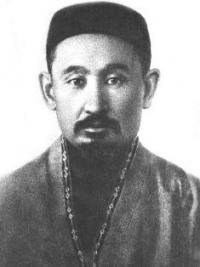You are here
Mausoleum of Gumar Karash.


Tours in the West Kazakhstan region.
"...Take a closer look,
Look in or out
Kazakh son pulled himself together
Do we see people among them?
To give a new generation a new clean education,
You have to dig the earth deep
In Kazakhstan, he saw his day,
Do we see a country in our own right?
He took ore from his land,
A beautiful crescent road has been paved
To follow the example of European art,
Do we see in our life?
That he created the Horde Alash,
The wealth of the garden was born and grew
In each case there is a smell of native land"
Gumar Karash.
Historical sights of the West Kazakhstan region.
The mausoleum of the outstanding Kazakh poet, folklorist, public and religious figure, supporter of the Alash party, Gumar Karash, was established and opened in 2018, in the Zhanibek district of West Kazakhstan region.
The mausoleum is built on charitable funds of local residents. The height of the mausoleum is 9 meters. Gumar Karash (1875 - 1921) - an outstanding Kazakh poet, folklorist, public and religious figure, supporter of the Alash party.
Born in the Zhanibek district of the West Kazakhstan region. He studied first at a local madrasah, then received a higher spiritual education in a madrasah in the city of Ufa, according to some reports, continued his studies in Istanbul.
Gumar Karash is the first Kazakh kazi (a member of the Spiritual Assembly of Muslims of the Eastern part of the Russian Empire). Having received a Muslim education, G. Karash for some time striving for a career as a religious figure.
However, soon G. Karash began to propagate enlightening ideas, advocated the reform of the old Kazakh meteb, and finally decisively broke with the clergy. In the future, he is fully engaged in literary work, collecting and publishing monuments of Kazakh poetry.
His name is associated with the appearance of the newspapers "Kazakhstan", "»ran" and a number of sharp polemic articles in the newspapers "Fiker" and "Kazakhstan", "Durystyz Zholy", the magazine "Shura". In 1902, he taught in his native village.
During the years of work in the newspaper “Kazakhstan”, under the leadership of Sh. Bokeyev, he collected and published samples of Kazakh folklore in the collections “Shayyr” and “Kөksіlder”. It should be noted the words of S. Seifullin about G. Karash in his novel “The Thorny Way”: “A number of educated people of the Bukeevsky Horde, led by the poet, Mullah Karashuly, organizing the publication of a newspaper called“ Uran ”, came out under the slogan of the ideas“ Alashorda”.
And those who rallied around the ideas of the Alash hordes were considered "enemies of the people." Naturally, the newspaper was added to this category. That is why the search for newspaper numbers was very difficult.
During the life of the poet, five of his poetry collections were published: Bala Talpar, Karlykash, Tumysh, Aka Talpar, Turimtai and three research books: Oyna kelgen piklerlerim, Urnek, Beldel Kazh. These were strong verses in the Tolғau genre, which introduced new forms into Kazakh versification.
Karash is rightfully considered one of the reformers of the Kazakh verse, brilliantly experimenting, combining Kazakh traditional poetry with Arabic (eastern) poetry in his verses, and having made a significant contribution to the rooting of this form in the Kazakh versification.
Karash - the most colorful figure in the history of the Urals - a poet, in whose work courageous civil pathos are intertwined with subtle lyricism, a philosopher who paved the golden bridge between the rational mentality of the West and the stable moral categories of eastern theology.
A supporter of the Alash party and his government, Gumar Karash, opposed the violent ways of overthrowing the existing social system and released a collection of poems Alashtyk Azamattaryn, Neden Korkamyn, Kun Tudy, but soon joined the struggle for Sovietization of the aul.
Authority and photos by:
https://ruh.kz/geo/zko/mesto_zahoroneniya_gumara_karasha/







